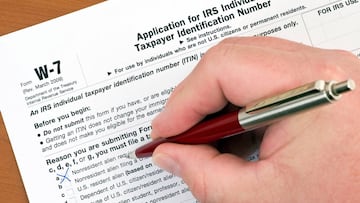Tax season 2023: Can you get tax credit if you don’t have a Social Security number?
A tax return uses an ITIN to identify you, your spouse, or a dependant without an SSN


The IRS gives Individual Taxpayer Identity Numbers (ITINs) to those who need a U.S. taxpayer identification number but are not qualified for a Social Security number (SSN).
A tax return uses an ITIN to identify you, your spouse, or a dependant without an SSN. For example, if you’re an immigrant waiting for legal status to work or live in the U.S., you’ll need an ITIN to submit a tax return.
People filing income taxes without social security numbers, including undocumented immigrants, pay more income tax than Donald Trump and many other very wealthy people in our Country. FYI, they also pay payroll taxes like SS but cannot collect. https://t.co/RwV8sqFJtE
— Pat (@usesquire18) June 12, 2021
Can you claim tax credits with ITINs?
Yes. ITIN holders may receive various tax benefits.
Child Tax Credit
- Each kid under 17 receives a $3,000 tax credit. (Under-6s may get $3,600.) Child status determines CTC eligibility. Only children with Social Security Numbers may get the CTC. Your spouse may have an ITIN or SSN. Advance payments were made under the 2021 American Rescue Plan.
- Schedule 8812, “Additional Child Tax Credit,” requires your ITIN and children’s SSNs to claim the CTC. In addition, CTC children must be U.S. citizens or residents. (Children with ITINs in Mexico or Canada may be tax dependents but not CTC dependents.)
- If you qualify, you may claim 2021 enhanced CTC even if your ITIN has expired. First, complete IRS Form W-7 to renew your ITIN. Then, mail your 2021 tax return and application. The IRS takes 11 weeks to reissue an ITIN.
Note: Children no longer need SSNs after 2025. CTC eligibility will return to former rules—the credit will be valued up to $1,000 per child, and you, your spouse, and your eligible kid may claim the CTC using Schedule 8812.
Credit for Other Dependents
- Qualifying families get a $500 non-refundable credit. This includes CTC-eligible ITIN-holding children over 17. Tax-dependent relatives like parents may also claim this benefit. This non-refundable credit reduces taxes alone. If you qualify for both this credit and the CTC, this will reduce your taxable income first.
- Unmarried persons may claim Head of Household filing status by claiming a dependant. Filing as “Head of Household” instead of single or married filing separately may lower income taxes.
Recovery Rebate Credit
- If you didn’t receive your third stimulus payment, you might claim it as the RRC on your 2021 tax return in 2022. Each qualified adult and qualifying dependant in a household receives $1,400 from the third stimulus check. Even with an ITIN, any family member with an SSN may get the third stimulus check. For example, in a home where both parents have ITINs, and their children have SSNs, the youngsters qualify for stimulus payments even if the parents do not.
Child and Dependent Care Credit
- The Child and Dependent Care Credit is a federal tax benefit that may help you pay for child or adult care required for employment or job search. The 2021 American Rescue Plan temporarily makes the credit fully refundable for the tax year 2021 (filed in 2022). In addition, the credit may refund even if you don’t owe taxes. For one dependant, it’s worth $4,000; for two or more, $8,000. Read more.
American Opportunity Tax Credit
- This $2,500 credit may lower college tuition. Credit is only available for the first four years of post-secondary study. Degree-seeking students are eligible.
Lifetime Learning Credit
- This household non-refundable credit is up to $2,000. It may cut post-secondary education costs, including job training, for everyone.
Related stories
IRS Form W-7, “Application for IRS Individual Taxpayer Identification Number,” is required to submit a tax return without an SSN. The IRS requires Form W-7, a tax return, and identification and foreign status documentation. Original or certified copies from issuing authorities are required. Form W-7 specifies acceptable papers.
If a minor cannot sign a Form W-7, a parent or guardian must tick the box in the signature space. Adult dependents and spouses must complete and sign Forms W-7.

